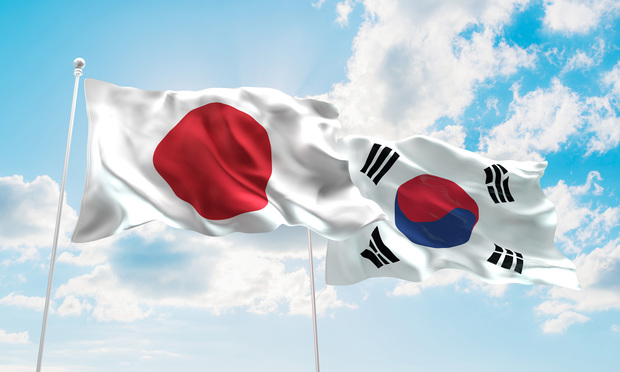New Delhi: Apparently, Japan and South Korea are once again at odds. On 8 January 2021, the Seoul Central District Court ordered the Japanese government to pay 100 million Korean won ($91,800) each to 12 Korean “comfort women,” who were allegedly abused by the Japanese military during World War II. The ruling granted a provisional execution of the compensation order, making it possible to immediately seize Japanese government assets.
Japanese Prime Minister Suga Yoshihide has retorted the South Korean ruling “will never be accepted”. His Foreign Minister Motegi Toshimitsu has chipped in the ruling is “against” the modern international law that grants sovereign immunity to every nation today.
Besides, Japan’s argument goes, the question of compensation for the comfort women is a closed chapter. The 2015 Japan-South Korea agreement settled all claims related to Japan’s 1910-1945 colonial rule of the Korean Peninsula. Under that agreement, Tokyo agreed to pay about 10.7 billion won ($90.5 million) to operate a foundation established by Seoul for the comfort women. Japan has already paid ¥1 billion to South Korea on this account. The rest could not be paid, for the administration of South Korean President Moon Jae-in dissolved the foundation in 2019, saying a previous government failed to properly reflect the women’s wishes in the 2015 deal.
However, such odds are highly unlikely to cause any serious damage to ties between the two nations. Knowledgeable sources say that ever since Japan and South Korea came to establish diplomatic relationship in 1965, there has been a positive evolution of ties between the two nations. The conflict over the issue of comfort women began in August 1991, when Kim Hak-soon revealed she had been forced into sexual slavery by the Japanese military during World War II. Afterwards, the then South Korean government registered 239 comfort women. The Kim testimony was followed by the famous “Wednesday Demonstration” that began in front of the Japanese Embassy in Seoul in January 1992 when then Japanese Prime Minister Miyazawa Kiichi visited South Korea.
South Korea (also North) and Japan have had disputes over history textbooks. Majority of Koreans still feel Japan has “no regret for its past wrongdoings”. Other points of friction between South Korea and Japan include their conflicting claims over the Liancourt Rocks (Dokdo/Takeshima)—a group of small islets located between the Korean island of Ulleungdo and the Oki Islands of Japan. People in South Korea also felt hurt when in the early 2000s Japanese Prime Minister Koizumi Junichiro visited the Yasukuni shrine during his term.
But Tokyo and Seoul have never allowed such odds to stall their growing ties in important areas. Seoul has been very considerate in the wake of the current court ruling. The South Korean Foreign Ministry has declared Seoul “has a policy not to make any additional claims against Japan”. It (South Korean government) would consult the comfort women “and endeavour to achieve an amicable solution”.
The diplomatic relationship between Japan and South Korea was established in December 1965, with the signing of the Treaty on Basic Relations. Subsequently, Japan recognized the Republic of Korea (ROK, the official name of South Korea) as the only legitimate government on the Korean Peninsula. In line with the 1965 reconciliation treaties, Tokyo provided $300 million as compensation to the South Korean victims of Japanese imperial rule and extended an additional $200 million credit to Seoul.
In July 1975, South Korea and Japan arrived at a “settlement” ending a two-year-old feud that had begun when South Korean agents abducted Kim Dae-jung, an opposition leader (future President of South Korea), from a Tokyo hotel. In September 1975, Japan joined the United States in providing assurances for South Korea’s security. In a joint statement by Japanese Prime Minister Miki Takeo and American President Gerald Ford declared: “The security of the Republic of Korea is … necessary for peace and security in East Asia, including Japan.”
Japan and South Korea today share common threats from North Korea, China and Russia. Both view the North Korean missile programme as a threat and are apprehensive at the military prowess of China. South Korea is aware that Japan has land-, sea-, air-, and space-based capabilities relevant to its (ROK’s) security.
Tokyo and Seoul are part of the General Security of Military Intelligence Agreement, or GSOMIA, an arrangement that facilitates direct intelligence-sharing between South Korea and Japan, two allies of the United States. To meet the potential threat from North Korea, the two sides agreed in 2016 to supplement the 2014 Trilateral Information-Sharing Arrangement, which enables them to pass information to each other by first sharing it with the United States and asking Washington to pass it onward, with a direct channel for intelligence cooperation.
South Korea has an investment agreement with Japan. South Korea and Japan are members of the Regional Comprehensive Economic Partnership (RCEP) and the Comprehensive and Progressive Agreement for Trans-Pacific Partnership (CPTPP).
Japan and South Korea look all set to boost their ties in the near future. In 2019, South Korean Prime Minister Lee Nak-yeon travelled to Tokyo for the enthronement of Emperor Naruhito. On the occasion, he carried with him a letter from President Moon to then Japanese Prime Minister Shinzo Abe to improve South Korea-Japan ties. Delivering his New Year’s speech the other day, President Moon said he would continue efforts to build a “future-oriented” relationship with Japan. Moon made no reference to the South Korean court ruling in the “comfort” women case.
Well-meaning analysts suggest South Korea and Japan may have a Free Trade Agreement (FTA) in the near future. In November 2012, South Korea and Japan (also China) launched negotiations on FTA. South Korea has a free trade mechanism with China. South Korea and Japan have held negotiations for the same since 2004. By signing the RCEP, South Korea has indirectly indicated it would sign an FTA with Japan.
Abhijitha Singh, an alumnus of the Department of East Asian Studies, University of Delhi, is specialising in Japanese studies.

